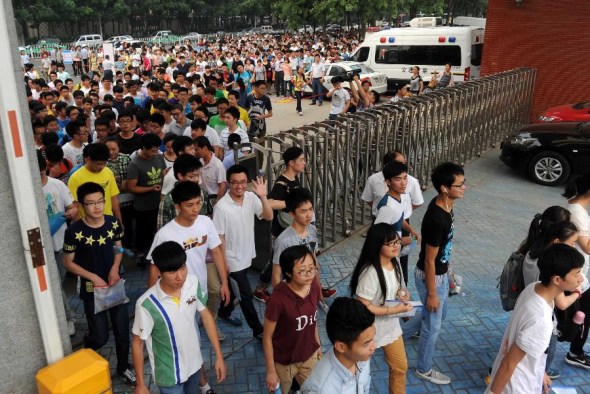

"Gaokao" candidates walk into an exam site of the national college entrance exam at Hefei World Foreign Language School in Hefei, capital of east China's Anhui Province, June 7, 2014. The exam, known as the "gaokao", began on Saturday. A total of 9.39 million people have registered for the exam this year to vie for 6.98 million vacancies in universities and colleges. (Xinhua/Liu Junxi)
The 2014 National College Entrance Examinations, known as gaokao, starts today. For many children of the common masses, this may be a new start to their life.
The severity of competition as well as the extent a large portion of the public is involved have made China's gaokaoa big focus around this time every year.
People have been debating whether this exam system has helped the country educate and select talented people or whether it has become a curse that has twisted youngsters' growth and turned itself into a meaningless contest among soulless testing machines.
One of the most valuable goals for gaokaois equality. But some are arguing that equality is impossible between a student born in a poor rural family and one born in an urban middle class family. Nor are the scores equal for students of different provinces to access the same universities.
Gaokaodemonstrates how complicated this country is. The two-day examinations have become so important for many young people and their families that too many social resources have been mobilized for this cause, sometimes even becoming twisted.
Some have been calling for reform of this examination system. But each step of reform drew even more criticism.
Gaokaohas come to this stage after years of questioning and criticism. But looking back, and looking around, many find that it is one of the fairest systems for young people on their way up.
To cheat in the exams, including using connections to manipulate the result, is still relatively difficult compared with competition in other areas. Gaokaois still one of the major ways for the poor or underprivileged to break through social ranks and change their life.
The gaokaosystem has wasted some time for the students. On the other hand, it has instilled fighting spirit in young people, and helped them to get used to rules and discipline.
No matter what kind of reform may come in the future for gaokao, one thing needs to stay the same: the competitive nature. Although the enrolled number of college students has grown dozens of times since the late 1970s, the intensity of competition has not dropped.
The pains of competition cannot be solved merely through reforming the examination system. Only after competition for jobs and personal success relax, or become more diversified, will the huge pressure from gaokaobe gradually released.
Chinese society currently cannot make gaokaoabsolutely fair for everyone. But it will seek greater equality. Let's send our best wishes to the 9.39 million students and their families, and wish them good luck.
Copyright ©1999-2018
Chinanews.com. All rights reserved.
Reproduction in whole or in part without permission is prohibited.